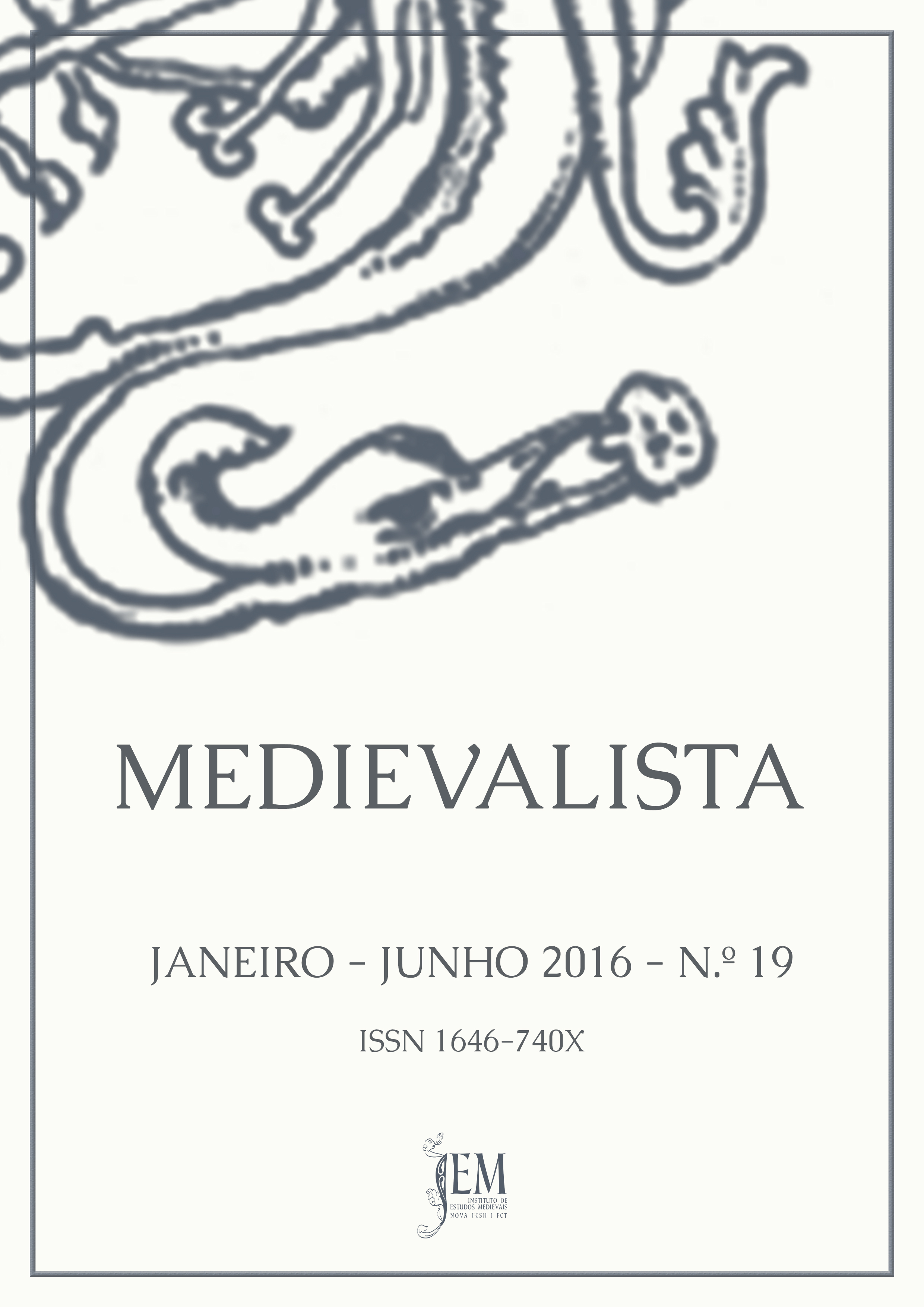The voice or the text completeness. Oral performance, reading practices and literary identity in the medieval West
DOI:
https://doi.org/10.4000/medievalista.958Keywords:
French Medieval Literature; Oral and written culture; History of reading; History of bookAbstract
In a famous episode described in his Confessions (Book VI, 3), St. Augustine expresses his confusion and perplexity to the attitude of his master and friend Ambrose whose eyes roam, in absolute silence, through the pages of a manuscript. How can we explain this astonishment that modern criticism has interpreted as a clear evidence that High Middle Ages, following the models of Classical Antiquity, mainly developed the reading aloud, rather than the Early Middle Ages that had invented silent reading? Through the privileged perspective of French Medieval Literature (but not only), these reflections aim to question the evolutionary and cognitive conception of the history of reading refocusing the problem in the irreducible tension – which has partly characterized Western culture – between the letter and the voice, between an idealization of the writing elevated into the magic sphere of the Sacred (or the Law) which places the oral performance under the sign of a corrupted fabula, and a long tradition that, from Plato to Hegel, assimilates logocentrism and phonocentrism. In this perspective, writing, a signifier of a signifier (Jacques Derrida), is nothing but a tarnished crystallization of the voice which emanates the entire Being and the unity of the word.
Bibliography
Sources
ADENET LE ROI – Ed. A. Henry. Genebra: Droz, 1982.
AGOSTINHO DE HIPONA – Confessiones. Ed. bilingue (Latim/Francês) de P. de Labriolle. Vol. 1. Paris: Les Belles Lettres, 1977.
AIOL. Ed. J. Normand e G. Raynaud. Paris: Didot, Société des Anciens Textes Français, 7, 1877.
BENOIT (SAINT) – Règle de saint Benoît. Ed. bilingue (Latim/Francês) de H. Rochais. Paris: Desclée de Brouwer, 1997.
BRUNETTO LATINI – Li livres dou tresor. Ed. crítica F. J. Carmody. Genebra: Slatkine, 1998.
CHRETIEN DE TROYES – Romans. Paris: Librairie Générale Française, 1994.
DANTE ALIGHIERI – Divina Comédia. Ed. bilingue de V. Graça Moura. Lisboa: Bertrand, 1995.
DU BELLAY. J. – Défense et illustration de la langue française. Ed. S. de Sacy. Paris: NRF-Gallimard, 1975.
FROISSARD, J. – Espinette amoureuse. Ed. A. Fourrier. Paris: Klincksieck, 1972.
GUILLAUME DE MACHAUT – Le Livre du voir-dit. Ed. P. Imbs. Paris: Librairie Générale Française, col. “Lettres Gothiques”, 1999.
HUGO DE SÃO VÍTOR – Hugonis de Sancto Victore Didascalicon de Studio Legendi. Ed. crítica de Ch. H. Buttimer. Washington: The Catholic University Press, 1939.
HUGO DE SÃO VÍTOR – L’Art de lire. Didascalicon. Trad. Francesa de M. Lemoine. Paris: Cerf, 1991.
ISIDORO DE SEVILHA – Etimologias. 2 vols. Ed. Bilingue (Latim/Espanhol) de J. Oroz Reta e M. A. Marcos Casquero. Madrid: BAC, 1982.
JACQUES DE VITRY – Histoire de l’Occident (Historia occidentalis). Trad. Francesa de G. Duchet-Suchaux, com introdução e notas de J. Longère. Paris: les Éditions du Cerf, 1997.
JEHAN BODEL – Chanson des Saisnes. Ed. A. Brasseur. Genebra: Droz, 1989.
TRISTAN DE NANTEUIL. Ed. K. V. Sinclair. Assen: Van Gorcum & Comp., 1971.
LA CHANSON D’ANTIOCHE. Ed. S. Duparc-Quioc. Paris: Librairie Orientaliste Paul Geuthner, 1977.
LA CHEVALERIE VIVIEN. Ed. D. McMillan. 2 vols. Aix-en-Provence: Université de Provence [sénéfiance, 39-40], 1997.
LA PRISE D’ORANGE. Ed. Cl. Régnier. Paris: Klincksieck, 1986.
LE MONIAGE GUILLAUME. Ed. N. Andrieux-Reix. Paris: Champion, 2003.
PHILIPPE DE BEAUMANOIR – Œuvres complètes de Philippe de Beaumanoir. Ed. H. Suchier. Paris: Société des Anciens Textes Français, 1984-85.
RABELAIS, F. – Le Quart Livre des Faicts et Dicts Heroïques du Bon Pantagruel. in Œuvres Complètes. Ed. P. Jourda. Paris: Garnier Frères, 1962.
RABELAIS, F. – Pantagruel. Ed. Guy Dermeson. Paris: Seuil, 1997.
RENAUT DE MONTAUBAN – Ed. J. Thomas. Genebra: Droz, 1989
ROBERT DE BORON – Merlin. Ed. A. Micha. Genebra: Droz, 1979.
REGNIER-BOHLER, D. (dir.) – La Légende arthurienne. Le Graal et la Table Ronde. Paris: Robert Laffont, 1989.
ROUSSSEAU, J.-J. – L’Émile ou de l’Éducation. Paris: Garnier-Flammarion, 1961.
TOMAS DE AQUINO – Summa Theologicae. Ed. Bilingue (Latim/Espanhol) de S. Ramirez, t. II. Madrid: La Editorial Católica, BAC, 1959.
Studies
BEDOS-REZAK, B. M.; IOGNA-PRAT, D. – L’Individu au Moyen Age. Paris: Aubier, 2005.
BIET, C. – “L’oral et l’écrit”. in DARMON, J.-Ch.; DELON, M. – Histoire de la France littéraire. Classicismes : XVIIe-XVIIIe siècle. Paris: PUF, 2006, pp. 409-434.
BOUTET, D. – La Chanson de geste: forme et signification d'une écriture épique du Moyen Âge. Paris: PUF, 1993.
BOUTET, D. – “L’oral et l’ecrit dans la France médiévale”. in F. LESTRINGANT; M. ZINK (dir.) – Histoire de la France littéraire. Naissances, Renaissances: Moyen Âge-XVIe siècle. Paris: PUF, 2006, pp. 193-212.
CARRUTHERS, M. – The Book of Memory: A Study of Memory in Medieval Culture. Nova York: Cambridge University Press, 1990.
CERQUIGLINI, B. – Éloge de la variante. Histoire critique de la philologie. Paris: Seuil, 1989.
CERQUIGLINI-TOULET, J. –“La scène de la lecture dans l’œuvre littéraire au Moyen Âge”. in BOHLER, D. (dir.) – Le Goût du lecteur à la fin du Moyen Âge. Paris: Léopard d’Or, 11, 2006, pp. 13-26.
CERTEAU, M. de – L’Invention du quotidien, 1. Paris: Gallimard, 1990.
CHARTIER, R – Culture écrite et société. L’ordre des livres (XIVe-XVIIIe siècle). Paris: Albin Michel, 1996.
CLAMOTE CARRETO, C. – ‘Contez vous qui savez de nombre’. Imaginaire marchand et économie du récit au Moyen Âge. Paris: Champion, 2014.
CLAMOTE CARRETO, C. – “Topique et utopie du livre au Moyen Âge: le texte (im)possible”. in MILON, A.; PERELMAN, M. (dir.) – Le Livre et ses espaces. Paris: Presses Universitaires de Paris 10, 2007, pp. 35-61.
CLEMENT. C. – La Voix verticale. Paris: Belin, 2012.
DERRIDA, J. – De la Grammatologie. Paris: Les Éditions de Minuit, 1967.
DERRIDA, J. – L’Écriture et la Différence. Paris : Seuil, 1967.
EISENSTEIN, E. – The Printing Press as Agent of Change. 2 vols. Cambridge: Cambridge University Press, 1979.
GALDERISI, Cl. – “Vers et prose au Moyen Âge”. in LESTRINGANT, F.; ZINK, M.(dir.) – Histoire de la France littéraire. Naissances, Renaissances. Paris: PUF, 2006, pp. 745-766.
GOODY, J. – The Power of the Written Tradition. Washington/ Londres: Smithsonian Institution Press, 2000.
GREEN, D. H. – Women Readers in the Middle Ages. Cambridge: Cambridge University Press, 2007.
HASENOHR, G. – “Le livre manuscrit”. in LESTRINGANT, M.; ZINK, M. (dir.) – Histoire de la France Littéraire. Naissances, Renaissances: Moyen Âge-XVIe siècle. Paris: PUF, 2006, pp. 151-173.
HAUG, H. – Fonctions et pratiques de la lecture à la fin du Moyen Âge. Approche socio-littéraire du discours sur la lecture en milieu curial d'après les sources narratives françaises et bourguignonnes [1360-1480]). Lovaina, 2013. Tese de Doutoramento apresentada à Universidade Católica de Lovaina.
JANNERET, M. – “La littérature et la voix: attraits et mirages de l’oral au XVIe siècle”. in KRAUS, D. – “Appropriation et pratiques de la lecture”, Labyrinthe [Em linha]. 3 (1999) [Consultado a 24 de março de 2015]. Disponível em www.http://labyrinthe.revues.org/56
LE GOFF, J. – Faut-il vraiment découper l’histoire en tranches. Paris: Seuil, 2014.
LEMOS, A. – “O Livro de Horas de D. Duarte. Estado da arte, percurso e caracterização de um manuscrito”. in BARREIRA, C. e METELO DE SEIXAS, M. (dir.) – D. Duarte e a sua época: arte, cultura, poder e espiritualidade. Lisboa: FCSH/IEM, 2014, pp. 211-239.
LESTRINGANT, F.; ZINK, M. (dir.) – Histoire de la France Littéraire. Naissances, Renaissances: Moyen Âge-XVIe siècle. Paris: PUF, 2006, pp. 212-233.
LEVINAS, E. – Ética e Infinito. Trad. portuguesa de J. Gama. Lisboa: Edições 70, 1988.
MANGUEL, A. – Une histoire de la lecture. Paris: Actes du Sud, 1998.
MATTOSO, J. – Poderes invisível. O imaginário medieval. Lisboa: Círculo de Leitores, 2013.
METELO DE SEIXAS, M.; GALVÃO-TELLES, J. B. – “Elementos de uma cultura dinástica e visual: os sinais heráldicos e emblemáticos do rei D. Duarte”. in BARREIRA, C. e METELO DE SEIXAS, M. (dir.) – D. Duarte e a sua época: arte, cultura, poder e espiritualidade. Lisboa: FCSH/IEM, 2014, pp. 257-283.
ONG, W. – Orality and Literacy: The Technologizing of the World. Londres/Nova York: Methuen, 1982.
PETRUCCI, A. – “Lire au Moyen Âge”. in Mélange de l’École française de Rome. T. 96. 2 (1984) pp. 603-616.
RICŒUR, P. – Soi-même comme un Autre. Paris: Seuil, 1990.
RUDDER, O. de – “Pour une histoire de la lecture”. Médiévales. 3 (1983) pp. 97-110.
SAENGER, P. – “Silent Reading: Its Impact one Late Medieval Script and Society”. Viator. 13 (1982) pp. 367-414.
SCHAEFFER, J.-M. – Petite écologie des études littéraires. Pourquoi et comment étudier la littérature ? Vincennes: Éditions Thierry Marchaisse, 2011.
SEGUY, M. – Les Romans du Graal ou le signe imaginé. Paris: Champion, 2001.
STOCK, B. – The Implications of Literacy. Written Language and Models of Interpretation in the Eleventh and Twelfth Centuries. Princeton: Princeton University, 1983.
VANDENDORPE, C. – Du papyrus à l'hypertexte. Essai sur les mutations du texte et de la lecture. Paris: La Découverte, 1999.
VAN HEMELRYCK, T. – “Du livre lu au livre écrit. La lecture et la construction de l’identité auctoriale à la fin du Moyen Âge”, in HERMAND, X., RENARD, E. e VAN HOOREBEECK, C. (dir.) – Lecteurs, lectures et groupes sociaux au Moyen Âge. Turnhout: Brepols, 2010, pp. 185-194.
YATES, F. – The Art of Memory. Chicago: University of Chicago Press, 1966.
ZUMTHOR, P. – Introduction à la poésie orale. Paris: Seuil, 1983.
ZUMTHOR, P. – La Lettre et la voix. De la «littérature» médiévale. Paris: Seuil, 1987.




















